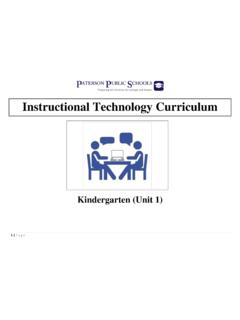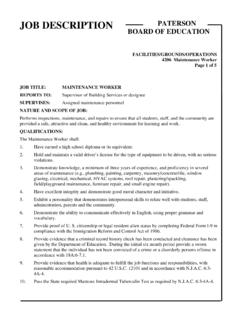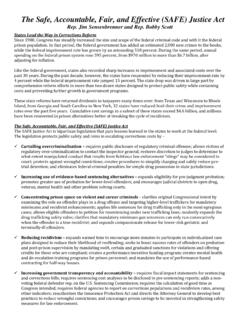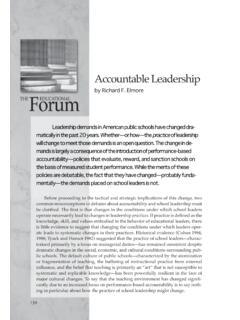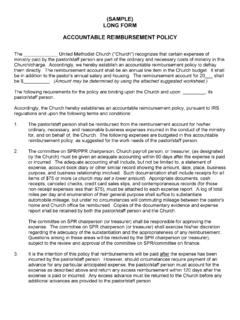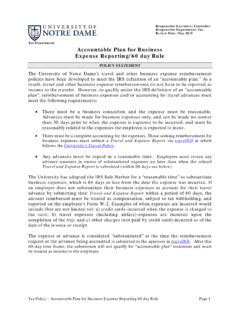Transcription of ACCOUNTABLE TALK SOURCEBOOK - paterson.k12.nj.us
1 AACCOUNTABLE CCOUNTABLE TTALKALK SSOURCEBOOKOURCEBOOK:: FFOR OR CCLASSROOM LASSROOM CCONVERSATION ONVERSATION TTHAT HAT WWORKS ORKS Version by Sarah Michaels Clark University Mary Catherine O Connor Boston University Megan Williams Hall University of Pittsburgh with Lauren B. Resnick University of Pittsburgh For additional material on ACCOUNTABLE Talk the IFL offers an online Self-Study Tool which is accompanied with video segments, audio interviews, and interactive activities. You can subscribe to the Self-Study tool from the Professional Development text link at Copyright 2010 University of Pittsburgh ii Table of Contents ENGAGEMENT WITH LEARNING THROUGH Accountability to Accurate Accountability to Rigorous Reading Between the Lines: What May Go Unsaid in an ACCOUNTABLE Talk EMBEDDING TALK IN RIGOROUS ACADEMICS.
2 MOVING FROM PURPOSES TO INSTRUCTIONAL TASKS TO ORGANIZING FOR THE ACCOUNTABLE TALK Stable Routines and Talk Talk Formats: What Kinds?..18 Teacher Norms for Equitable and Respectful ALL STUDENTS HAVE A RIGHT TO ENGAGE IN ACCOUNTABLE TALK APPENDIX A: The Principles of APPENDIX B: Research Pertaining to APPENDIX C: Ways with Words: A Case of Ethnography of APPENDIX D: Cultural Differences: Two Cases in APPENDIX E: Anthropological Research on Classroom Copyright 2010 University of Pittsburgh 1 ENGAGEMENT WITH LEARNING THROUGH TALK Talking with others about ideas and work is fundamental to learning. It gives us the opportunity to organize our thinking into coherent utterances, hear how our thinking sounds out loud, listen to how others respond, and, often, hear others add to or expand on our thinking.
3 But not all talk sustains learning. For classroom talk to promote learning it must be ACCOUNTABLE : to the learning community, to accurate and appropriate knowledge, and to rigorous thinking. ACCOUNTABLE Talk 1 classrooms are filled with talk that seriously responds to and further develops what others in the group have said. It puts forth and demands knowledge that is accurate and relevant to the issue under discussion. This academically productive talk uses evidence appropriate to the discipline ( , proofs in mathematics, data from investigations in science, textual references in literature, documentary sources in history) and follows established norms of good reasoning.
4 This discourse sharpens students' thinking by reinforcing their ability to use and create knowledge. There is an extensive research base on classroom discourse which examines the nature of classroom talk and the relationship between talk and learning in school. Researchers and experienced classroom teachers alike know that simply getting students to talk out loud or talk to one another does not necessarily lead to learning. What matters is what students are talking about and how they talk. When students are merely chatting about social events and personal matters or if they are simply going through the motions of discussion without really working on the learning problem the talk distracts from their learning rather than advancing it.
5 ACCOUNTABLE Talk practices are not something that spring spontaneously from students' mouths. It takes time and effort to create an ACCOUNTABLE Talk classroom environment in which this kind of talk is a valued norm. It requires teachers to guide and scaffold student participation. Teachers create ACCOUNTABLE Talk norms and skills in their classrooms by modeling appropriate forms of discussion and by questioning, probing, and leading conversations. For example, teachers may press for clarification and explanation, require justifications of proposals and challenges, recognize and challenge misconceptions, demand evidence for claims and arguments, or interpret and "revoice" students' statements.
6 Over time, students can be expected to carry out each of these conversational "moves" themselves in peer discussions. Once the norms for conversation within the classroom have been established, academically productive talk is jointly constructed by teachers and students, working together towards rigorous academic purposes in a thinking curriculum. 1 ACCOUNTABLE Talk is a registered trademark of the University of Pittsburgh. Copyright 2010 University of Pittsburgh 2 Conversations in the classroom can take a wide variety of forms: whole class discussion, small group work, partner talk, peer or teacher conferences. But regardless of which form is used, talk should be ACCOUNTABLE to the learning community, to knowledge and the standards of evidence that are appropriate for the subject, and to generally accepted standards of reasoning.
7 These forms of accountability can be seen in what the students say and in what the teacher says. They are supported by classroom norms and recurring activities as well as by carefully designed tasks. All students have a right to engage in ACCOUNTABLE Talk discussions, not just the "best and brightest," nor only those who are struggling in school. It is not something that should be limited to special times of the day, or to special groups of students. And we should expect to find ACCOUNTABLE Talk discussions across all grade levels and in all subject areas. The process of Socializing Intelligence takes place in and through talk. Intelligence is much more than an innate ability to think quickly and stockpile bits of information.
8 Intelligence is a set of problem-solving and reasoning capabilities along with the habits of mind that lead one to use those capabilities regularly. It is also a set of beliefs about one s right and obligation to understand and make sense of the world and one s capacity to figure things out over time. Intelligent habits of mind are learned through daily expectations placed on the learner. By calling on students to use the skills of intelligent thinking and by holding them responsible for doing so educators can teach intelligence. Accountability to the Learning Community When classroom talk is ACCOUNTABLE to the learning community, students listen to one another, not just obediently keeping quiet until it is their turn to take the floor, but attending carefully so that they can use and build on one another's ideas.
9 Students and teachers paraphrase and expand upon one another's contributions. If speakers aren't sure they understood what someone else said, they make an effort to clarify. They disagree respectfully, challenging a claim, not the person who made it. Students move the More About Socializing Intelligence Socializing Intelligence is one of the Institute for Learning s nine Principles of Learning. The Principles of Learning may be found in Appendix A. For more on this topic, read Socializing intelligence by Lauren B. Resnick and Sharon Nelson-LeGall: Resnick, , & Nelson-LeGall, S. (1997). Socializing intelligence. In L. Smith, J. Dockrell. & P. Tomlinson (Eds.), Piaget, Vygotsky and beyond (pp.)
10 145-158). London/New York: Routledge. Copyright 2010 University of Pittsburgh 3 argument forward, sometimes with the teacher's help, sometimes on their own. Obviously, this kind of talk calls for a certain amount of patience, restraint, and focused effort on the part of students and teachers alike. A youngster who experiences a blinding insight in the middle of a discussion may need to be reminded not to trample all over her classmates' talk in her eagerness to express her thoughts. An adolescent trying out a new idea in front of his peers may need encouragement to articulate his position. And educators, with limited time to help their students reach the standards, must skillfully balance unwavering attention to their learning goals with moments where a discussion takes a detour.
